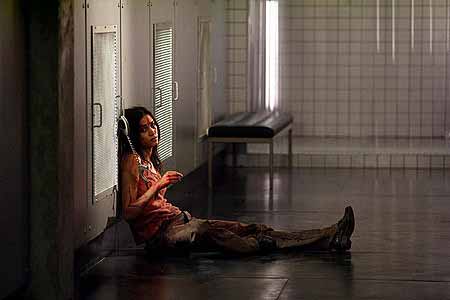|
Click here to return to the main site. Pascal Laugier (Director / Writer) - Martyrs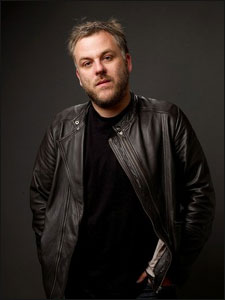 Pascal Laugier is a French film director who is notable for having written and directed movies including Saint Ange (House of Voices) and the genre defying Martyrs. One of his future projects will see him involved in the reboot of Clive Barker's Hellraiser movie. He has also sold the rights for Martyrs to be remade in America. Darren Rea caught up with Laugier as Martyrs was released in UK cinemas... Darren Rea: Alfred Hitchcock is always cited as the master of misdirection and I couldn't help feel that Martyrs was very much like a modern Hitchcock movie.
DR: Was it always planned that you were going to try and mess with the audiences perception of what sort of movie they were watching? PL: Yes, the idea from the beginning was always to bring something original, something fresh and trying to do an unexpected film. So, yeah, I consciously played with the archetypes of the horror genre. Trying to bring something new. As a general fan - I don't want to sound arrogant - but I was honestly a little bit tired about how things were becoming. Sometimes I had the feeling that a lot of the directors were doing horror films just to show the audience that they shared the same collection of DVDs. I wrote the film on a very emotional level, trying to be as sincere and as honest as possible. I certainly didn't want to do a tongue in cheek movie. DR: You tried a new way of directing for this movie, where you attempted to capture reality and so sometimes you wouldn't tell the camera operators what was going to happen. Was that hard for the crew to adjust to? PL: Yes, of course, especially for an American crew. For co-production reasons we shot the film in Montreal and Quebec. And the American system on the set is not very used to that more European method. They like shot lists and everything, and I refused to do that because, once again, I really wanted to bring as much reality to it as I possibly could because my first film was so over controlled - everything was storyboarded - and directing the film for me was like trying to recreate a storyboard on set. I was constantly the enemy of reality. In Martyrs it was the opposite. I tried to let reality interconnect as much as possible with the shooting process. DR: Did that make the film harder to edit?
I shot very long shots trying not to cut the camera as much as possible, because any time I turned off the camera I took the risk that my actresses couldn't find the right state again, because we were dealing with so many tiers and extreme emotions from the actresses. It was a tough process. DR: Was that emotionally draining for the cast? PL: Yes, I guess it was. Crying on camera is not that difficult, but the tricky part is doing it ten hours a day, six days a week, constantly hurting. The actresses had to constantly hurt themselves. In the morning they were very fresh and filled with energy because they had slept well. So the first shot was really great and then [laughs] the rest of the day they had to be as good as the first shot without losing any intensity. So sometimes on the set I was the bad guy. The crew was tempted to be very protective of the actresses and I had to prevent them from doing that because I wanted my actresses to feel lonely and kind of miserable to be able to play what the script needed. So, yeah, some times I felt like the bad guy, but the only thing I was thinking about was the final results. DR: Didn't the makeup guy also fall asleep, leaving one of the girls in her makeup?
So it created a kind of small scandal. And the next day he bought her beautiful flowers to be excused. DR: The movie has been exported to over 40 foreign countries. Did that surprise you? PL: As we were shooting such a low French budget in Canada, doing this very specialist film, even from a French point of view, it was a very specialist film, very far away from the common French film. I certainly couldn't guess what the future of the film would be. I'm the first to be amazed that the film has been sold in like 40-45 countries. That's the thing I'm the proudest about. At the same time, our horror French films don't make a lot at the French box office, and the only reason we keep on doing them is because of the International market. DR: What's the movie industry in France like at the moment. Is it hard to get financing for movies like this. PL: Oh yes, it's still hell. Foreigners have a feeling that something miraculous is happening in Paris right now, that a lot of money is around to make this sort of film, and that there is a kind of new wave of horror movies coming out of France. The reality is much more pragmatic. It's still hell to find funds to do this kind of film. The horror genre is still considered very condescendingly by a lot of people here. It also gives an energy to do it. The more the horror genre is despised in my country, the more I feel like trying to do it. DR: Your next project is a remake of Hellraiser...
It's a little bit too soon to talk about it - the buzz on the Internet goes much faster than the reality. DR: Do you appreciate the irony that after trying to get away from the cliched horror movie, by making Martyrs, that one of your next projects may be remaking Hellraiser? PL: The idea behind Hellraiser is not to do a remake - it's to do what they call a reboot - that is to say a new version. So what I am proposing to Dimension, the Studio behind Hellraiser, is some elements coming from the first film mixed with brand new stuff. My main problem, honestly, with the Hellraiser reboot is that Hellraiser is very transgressive material - it deals with S&M, and gay issues, and I really want to be faithful to the book and Clive Barker's world - I don't want to betray him. So if I have the feeling that I am being asked by Hollywood to soften the franchise I will leave in a blink. DR: You're a huge movie buff yourself. If there was any movie you could have made yourself which would it be? PL: Oh, any Stanley Kubrick film [Laughs]. I would sell my mother to have done Barry Lyndon, The Shining or 2001, of course. I wouldn't be very original on this one, you know. DR: Would you be tempted to movie to Hollywood exclusively and turn your back on the French film industry?
The only problem is that after I did Martyrs I received one French proposal and at the same time I received like 50 American proposals. So after a while you go to see people who desire you the most, because doing films you need to be a little bit loved, a little bit desired. So far Hollywood has called me much more than any French producer. That's a fight. You have to keep moving, you have to do films and Los Angeles right now is one of the solutions for a guy like me. I will never be about to do a film for French television. I will never be about to do a comedy film with French stars coming from TV program - it's not in my blood. I am totally unable to do that, so I have to find my own productions, which is very hard believe me. A genre really exists in a national industry if it's done industrially. The Italian made 600 westerns. It's not by doing three or four prototype horror French films that is going to create a new wave - I don't believe in it. DR: The ending to Martyrs is left for the audience to make up their own mind what Mademoiselle learns. For you, what do you think she learns?
I'm very comfortable in having an open ending - like a good old Twilight Zone episode. When you'd finished watching a good Twilight Zone episode you thought about the moral and the philosophy of that episode, and that's something I love in the fantasy horror genre. It's a genre that's supposed to give you the key of very essential questions like the secret of death, supernatural stuff - it's supposed to answer you, but it never does of course because it's a metaphysical question. We can't answer the metaphysics. That's also why you go to see another horror film, that could give you the answer, and another one and another one. It probably creates the addiction to the genre. That's one of the reasons the genre creates so much addiction amongst the fans. DR: Can you see there being a Martyrs II? PL: I don't know, but I know that the Americans have plans to remake it. I refuse to write and direct it, of course, because I have already spent two years on this one - and [laughs] that's more than enough if you want my opinion. So, I will watch the American remake as a regular member of the audience. DR: Do you personally believe in life after death?
Sometimes I have this feeling... Like everybody, sometimes I have this feeling of grace in me. It can be walking in the street, or watching a good film or listening to good music. Sometimes when I do nothing, like sitting on my couch, like a supernatural, unexplained phenomenon for a few seconds I feel the grace in me, that would almost make me cry. But it's very short and like everybody the rest of the time is doubting. DR: If a movie was to be made of your life who would play you? PL: I would love James Mason to play me, just because I love him and, for me, he is the perfect man - that is to say he is handsome and feminine at the same time - which I am not. I am not handsome. James Mason is one of my perfect projections of me on screen [laughs]. DR: If you woke up tomorrow morning and decided you'd had enough of the film industry what would you turn your hand to? PL: Er... I'd probably open a video store, or something like that, because besides doing films I still love other peoples films. And honestly, I'm much more interested in other peoples work than mine. What I love is doing films, but after a film is done I never watch it again, and go to the next one. I do films to make enough money to buy all the DVDs I want, because I'm not fed up with cinema - with other people's films. Which prevents me from masturbating on my own work. DR: Thank you for your time.
Martyrs is released to buy on Blu-ray and DVD from Optimum Home Entertainment from 24 May 2009. Click here to buy Martyrs on Blu-ray for £13.69 (RRP: £19.99) This interview was conducted on 17 March 2009 Return to... |
|---|
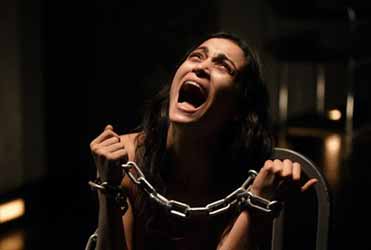 Pascal Laugier: Yeah? That's the first time I've been told that. Thank you.
Pascal Laugier: Yeah? That's the first time I've been told that. Thank you.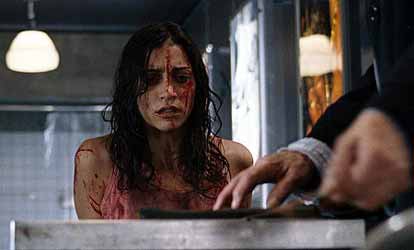 PL: Yes. It took us at least six months to finally start to see the final shape of the film because the dailies were kind of strange.
PL: Yes. It took us at least six months to finally start to see the final shape of the film because the dailies were kind of strange.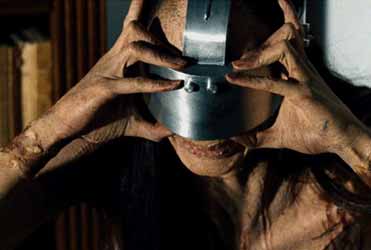 PL: Oh, yes. Benoît Lestang, the makeup wizard behind the special effects, was so exhausted one day that he fell asleep - I think it was in his car - fell asleep instead of going back to the set to take off the makeup from the actresses skin.
PL: Oh, yes. Benoît Lestang, the makeup wizard behind the special effects, was so exhausted one day that he fell asleep - I think it was in his car - fell asleep instead of going back to the set to take off the makeup from the actresses skin.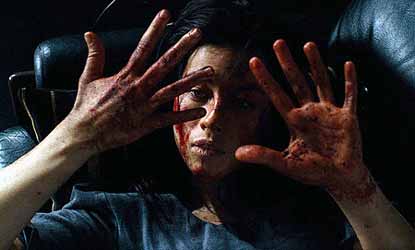 PL: Hellraiser is one of my projects. I was lucky enough to sign for three or four various projects in Hollywood and we'll see which one happens first.
PL: Hellraiser is one of my projects. I was lucky enough to sign for three or four various projects in Hollywood and we'll see which one happens first.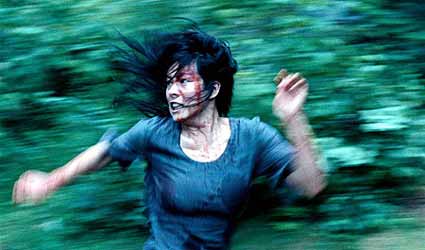 PL: You know, a few years ago I would have told you that I wouldn't go because I felt I'm more needed in France because we have to make things change in France and Hollywood doesn't need us - which I still think is the case.
PL: You know, a few years ago I would have told you that I wouldn't go because I felt I'm more needed in France because we have to make things change in France and Hollywood doesn't need us - which I still think is the case.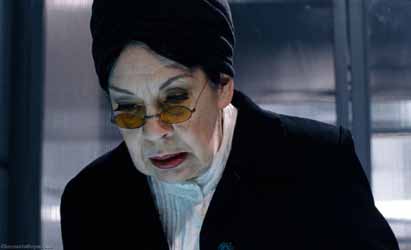 PL: Oh, I can't answer the question because the film refuses to answer the question.
PL: Oh, I can't answer the question because the film refuses to answer the question. 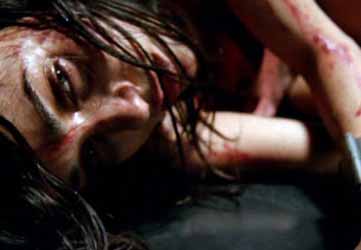 PL: I'm an agnostic. I just don't know, and I don't think it's the goal of our life to know it. I think the only secret of the actual life is just live the present, live the moment. And we'll see, in time, what's happening. I hope so.
PL: I'm an agnostic. I just don't know, and I don't think it's the goal of our life to know it. I think the only secret of the actual life is just live the present, live the moment. And we'll see, in time, what's happening. I hope so.